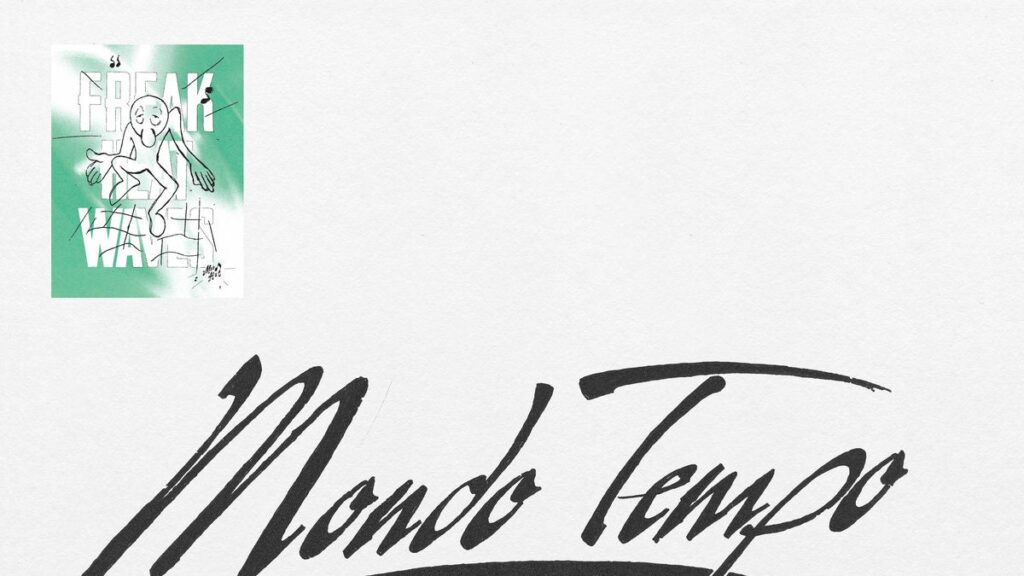
In the 13 years that Canada’s Freak Heat Waves have been making music, they have channeled a welter of influences: post-punk, shoegaze, dub, goth, Detroit techno, Japanese synth pop, German prog. Drop the needle at random on one of their records and you might be reminded of Black Dice or Gary Numan, Can or Tones on Tail, Seefeel or Brian Eno. Freak Heat Waves’ music represents not so much a style as a sensibility: druggy, unkempt, and a little bit dangerous, a souped-up ride whose wheels could fall off at any moment.
Until now, there was nothing in Freak Heat Waves’ catalog to suggest that the duo of Steven Lind and Thomas Di Ninno were capable of—much less interested in—making a song like “In a Moment Divine,” the standout on Mondo Tempo, their fifth album. Featuring guest vocals from their longtime friend and collaborator Cindy Lee (aka Pat Flegel, formerly of Women), it’s an almost shockingly sentimental offering from a group that has typically paired lumpy drum machines and oozing synths with a baritone drawl as gnarled and imposing as the trunk of a fallen oak. “In a Moment Divine,” by contrast, begins with a rosy blush of pads before kicking into an easygoing breakbeat house cadence. “The gates of heaven open with your smile,” sings Lee, and no matter how cryptic the details—is it a farewell to a lover? a tribute to a tragic figure?—the song’s emotional valence is unguarded and deeply affecting. Garlanded with production reminiscent of New Order’s Power, Corruption and Lies, Lee’s high, wistful voice is faintly reminiscent of the Pet Shop Boys, but there’s something idiosyncratic about it all—the melancholy silver-screen strings, maybe, or the way the parts feel Scotch-taped together—that transcends pastiche, or even homage. This isn’t the first time that Freak Heat Waves have sounded chill, but it’s the first time they’ve sounded so unabashedly beautiful.
Nothing else on Mondo Tempo quite matches that song’s heart-on-sleeve yearning, but the record nevertheless marks a significant change from their last album, 2020’s Zap the Planet. There, they downshifted into an uneasy strain of downbeat, pairing trip-hop beats and clunky ’80s drum machines with low-key funk and gloopy psychedelia. Although more laid back than its predecessors, Zap the Planet was still smoggy and dank. On Mondo Tempo, the skies clear. Suffused in crisply programmed drum grooves, bluesy vocal samples, and lush synths, the album filters Balearic-beat influences through the slightly shaggy style of house music practiced by Vancouver, BC’s Mood Hut, who put out the record.
“The Time Has Come” opens the album with a jaunty sampled sax riff drizzled over a trim disco-funk groove complete with chicken-scratch guitar. Between dubbed-out breaks and moody bass riff, “How Do We Come Alive” would have been right at home on Mo Wax’s classic Headz compilations. “Endless” bubbles with trance-gate effects, a background vocal sample that Play-era Moby would have killed for, and hard-panned drums that feel like a breakbeat embrace. (It can’t be overstated how funky many of these songs are—with little more than a few subtle bass nudges and some carefully swung snares, their grooves feel tailor-made for the basement-party long haul.) The title track is the apotheosis of their fuzzy-headed retro: The syncopated drum programming suggests a narcoleptic take on new jack swing, the synths would have been right at home on Twin Peaks, and there’s even a sax solo straight out of Blade Runner’s noir imaginary.
However much Mondo Tempo diverges from the group’s previous records, there’s an obvious throughline in the form of Lind’s gravelly, drawn-out vocals, which present him as a kind of Lothario on ludes. It’s not the depth of his register that’s striking so much as its slightly greasy panache. His loamy purr carries an unmistakable hint of menace, and his often unintelligible syllables feel like sleight of hand: The way he draws out his words, you may forget how a line began by the time it finishes. In fact, despite the leisurely grooves, Lind’s lyrics are frequently anything but chill, and have little to do with anything resembling sensual pleasures. “Our time at last, free of the past,” he announces on “The Time Has Come.” Any shades of yearbook-quote optimism quickly curdle as he pushes into more ambiguous terrain: “Is there a method to the wild/A fear to evolve/Does it lead to one setting sun.” Peel back the blissed-out blister pack and dejection swells to fill the hedonistic vacuum. “Are we bound to lose or ruin the mood,” he asks in “How Do We Come Alive,” noting, “There’s an ominous feeling to us.” The perky “Endless” begins optimistically enough, but its meager two lines turn out to be a frighteningly economical accounting of disaster: “I wish that it was endless, spanning lives of plastic/Are we helpless, spinning tires to ashes.”
The more closely you listen to Lind’s lyrics, in fact, the more that Mondo Tempo’s summery quality starts to sound like a bleakly sarcastic joke. The title track locks into an uneasy mantra: “One degree worldwide, one degree worldwide…/Let’s realize it’s a crime/I think it’s a sign that it’s on the rise.” In a season marked by Canadian wildfires, heating oceans, and sweltering temperatures around the globe, deciphering the song’s message isn’t particularly difficult. Such doomsaying lyrics add a provocative dimension to Freak Heat Waves’ baleful take on Balearic, making an already captivating album that much more rewarding to untangle.
